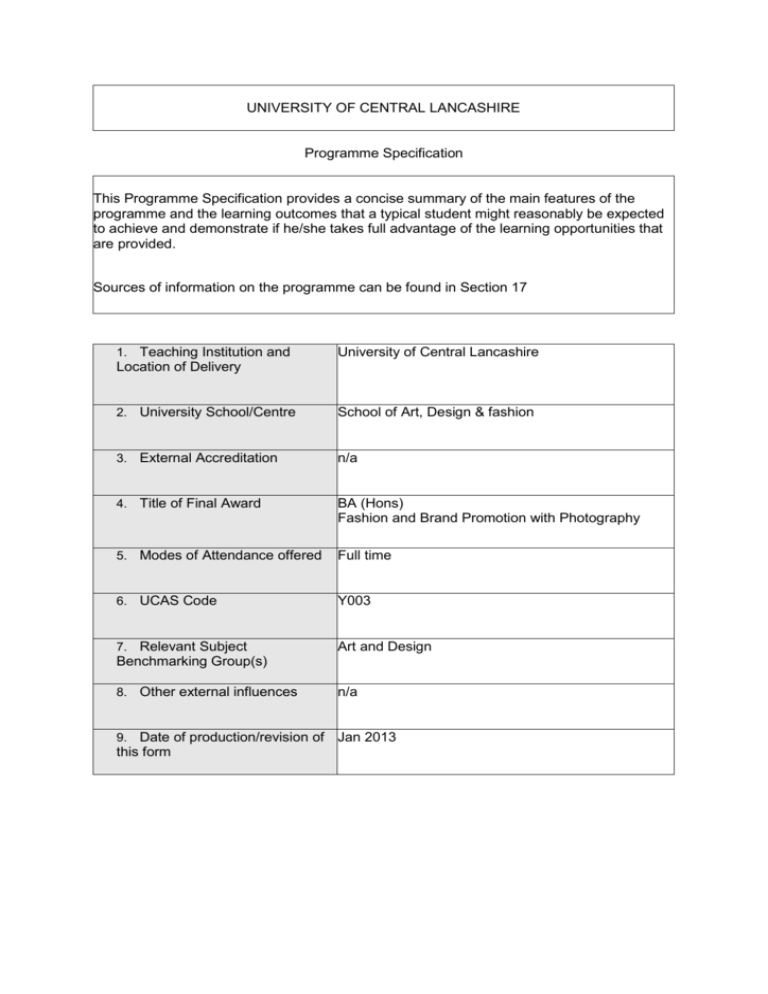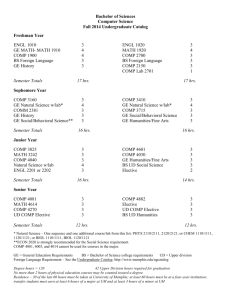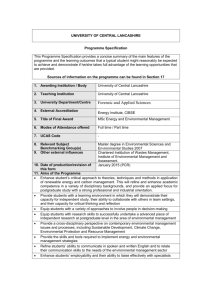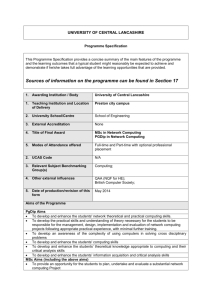BA (Hons) Fashion and Brand Promotion with Photography (Sept
advertisement

UNIVERSITY OF CENTRAL LANCASHIRE Programme Specification This Programme Specification provides a concise summary of the main features of the programme and the learning outcomes that a typical student might reasonably be expected to achieve and demonstrate if he/she takes full advantage of the learning opportunities that are provided. Sources of information on the programme can be found in Section 17 1. Teaching Institution and University of Central Lancashire Location of Delivery 2. University School/Centre School of Art, Design & fashion 3. External Accreditation n/a 4. Title of Final Award BA (Hons) Fashion and Brand Promotion with Photography 5. Modes of Attendance offered Full time 6. UCAS Code Y003 7. Relevant Subject Art and Design Benchmarking Group(s) 8. Other external influences n/a 9. Date of production/revision of Jan 2013 this form 10. Aims of the Programme To provide an academic structure within which it is possible to develop the necessary creative and intellectual skills for progressing within a career related to and including the promotion of various elements within the Brand, Lifestyle and Promotion industries. (Creative) To develop an environment in which creative / innovative thought process is encouraged and stimulated To develop technical and academic skills relevant to professional working practice within the creative, promotion/brand industries (Professional) To develop a knowledge and awareness of the fashion, brand, trend and lifestyle related industries and professional practice To develop an understanding of personal capability, competence and self management To develop transferable skills of self evaluation, independent research and project management and development 11. Learning Outcomes, Teaching, Learning and Assessment Methods A. Knowledge and Understanding Year 1 (Level 4) A1.1 Describe the attributes of basic market and customer profile characteristics A1.2 Demonstrate an awareness of trend/colour at an introductory level A1.3 Define and describe a basic promotional structure/model A1.4 Have an understanding of key terms appropriate to the photography A1.5 Demonstrate an understanding of the course requirements in terms of research, development and evaluation of work. Year 2 (Level 5) A2.1 Identify and implement a wide range of research sources and methodologies A2.2 Demonstrate an awareness of a broad range of market influences A2.3 Demonstrate an ability to self manage A2.4 Interpret solutions through a knowledge of trend/colour direction A2.5 Demonstrate an awareness of a range of concepts and subjects relating to contemporary photographic practice Year 3 (Level 6) A3.1 Illustrate an in depth knowledge and awareness of Market levels and customer profile A3.2 Demonstrate a thorough knowledge of colour and its use within promotion/brand/lifestyle A3.3 Describe a professional approach to the management of both time and resources A3.4 Describe a thorough range of research strategies and methodologies A3.5 Create professional level photographic work in practical and critical terms Teaching and Learning Methods Lectures, plenary and small group discussion; case study analysis; background reading and research; guest speakers, group research tasks, seminar sessions and individual tutorials Assessment methods Practical submissions, individual/group research tasks, presentations, portfolios, dissertation proposal and written submissions. B. Subject-specific skills Year 1 (Level 4) B1.1 Demonstrate basic presentation techniques and their application B1.2 Illustrate an awareness of colour and its application B1.3 Demonstrate a basic knowledge of key computer packages and apply them in project solutions B1.4 Demonstrate a range of skills in digital photography and image production B1.5 Demonstrate the ability to manage time Year 2 (Level 5) B2.1 Undertake studio briefs, including designing, planning and executing projects B2.2 Demonstrate a professional level of computer competence in relation to graphic solutions B2.3 Demonstrate a professional approach to the use of colour and trend B2.4 Illustrate the ability to use digital media to a professional standard Year 3 (Level 6) B3.1 Integrate the appropriate IT solution at an advanced level in the production of all promotional material B3.2 Display expertise and professionalism at all stages of production and presentation B3.3 Fully integrate the use of digital media which demonstrates a level of expertise across a wide range of creative applications B3.4 Undertake appropriate research using both primary and secondary source material Teaching and Learning Methods Lectures, exercises, plenary and small group discussion; case study and digital analysis, background reading; seminars and tutorials. Assessment methods Practical submissions, reports, individual and group case study analyses; individual and group research tasks; group presentations, dissertation proposal and dissertation, final brand project. C. Thinking Skills Year 1 (Level 4) C1.1 Develop and demonstrate creativity in relation to practical problems C1.2 Develop, demonstrate and express creativity and imagination C1.3 Analyse research information and develop investigative strategies C1.4 Recognise and apply practically key concepts that relate to photography Year 2 (Level 5) C2.1 Demonstrate imagination, innovation and creative thinking to a range of abstract problems C2.2 Illustrate an ability to thoroughly analyse research and select appropriate media for practical solutions C2.3 Debate the appropriateness of creative solutions to specific problems C2.4 Evaluate practical work with a strong contextual awareness Year 3 (Level 6) C3.1 Apply creative thinking to a range of complex problems across a broad spectrum of promotional activity C3.2 Illustrate the ability to analyse, evaluate and select a variety of creative promotional solutions to abstract problems C3.3 Demonstrate original, innovative and imaginative responses within the constraints of commercial practice C3.4 Use appropriate critical, analytical, theoretical or methodological approaches to a chosen topic Teaching and Learning Methods Lectures, exercises, plenary and small group discussion; case study and digital analysis, background reading; seminars and tutorials. Assessment methods Individual and group reports, individual and group presentations; critical review of a range of publications; portfoli0; final project dissertation research proposal and dissertation D. Other skills relevant to employability and personal development Year 1 (Level 4) D1.1 Identify their own study needs, and develop strategies for dealing with these D1.2 Illustrate the ability to communicate through group project work D1.3 Demonstrate the ability to problem solve by offering a range of solutions to abstract problems D1.4 Apply a range of writing skills for a variety of media Year 2 (Level 5) D2.1 Apply numerical skills in relation to budget considerations D2.2 Display an ability to communicate and participate in team projects D2.3 Apply writing skills to a professional standard across a range of academic requirements D2.4 Demonstrate an ability to plan and manage time in respect of an increased work load D2.5 Apply imaginative and creative solutions to a range of promotional problems D2.6 Demonstrate insight into industry expectation of skills levels and professional behaviour Year 3 (Level 6) D3.1 Display an expertise in the analyse of statistical information and numeracy in relation to project solutions D3.2 Apply communication skills outside peer group, to include outside and professional agencies D3.3 Create work with professional level standards of production and presentation within resource constraints D3.4 Demonstrate an ability to manage time and output to a standard required in professional practice D3.5 Apply a level of written expertise across a wide spectrum of academic and professional situations/solutions Lectures, exercises, plenary and small group discussion; case study and digital analysis, background reading; seminars and tutorials. Assessment methods Essays, learning logs, individual and group reports and oral presentations, case study analyses, project plans, dissertation proposal, dissertation, portfolio and final brand project. 13. Programme Structures Level Year 3 Level 6 Year 2 Level 5 14. Awards and Credits Module Code FM3021 Module Title FM3022 Final Presentation 20 FM3023 Review Report 20 Personal Penultimate Presentation Credit rating 20 FM3990 Final Report 20 PH3010 Portfolio Development 20 PH3011 Professional Development 20 FM2021 Promoting Fashion Related 20 Products FM2022 Developing skills relevant to 20 Promotional Campaigns FM2023 Product Development 20 FM2024 Promotion Related Report 20 PH2005 Fashion Branding & Photography 20 PH2020 Open Project 20 Bachelor Honours Degree Requires 360 credits including a minimum of 120 at Level 5 and 120 at Level 6 Bachelor Degree Requires 320 credits including a minimum of 120 at Level 5 and 80 at Level 6 HE Diploma Requires 240 credits including a minimum of 120 at Level 5 or above Year 1 Level 4 FM1021 Intro into Fashion and Brand 20 Promotion FM1022 Introduction into Promotional 20 Campaigns FM1023 Introduction into Colour in Lifestyle Promotion 20 PH1001 Photography & Narrative 20 PH1003 Photography & the Everyday 20 PH1004 The Fashion Image HE Certificate Requires 120 credits at Level 4 or above 20 15. Personal Development Planning The development of a student’s individual profile and aspiration is embedded in the delivery of Fashion and Brand Promotion and Photography programme to enable student’s future career aspirations within the Fashion Industry. In Level 4 students are guided through tutorial PDP sessions to establish a personal audit of transferable skills against potential employability in the fields of Fashion and Brand Promotion and Photography. In Level 5 students are encouraged through tutorial to set their own PDP targets focusing on targeted employability in Fashion and Brand Promotion. In Level 6 students are expected to promote their own individuality and personal career direction in a professional manner for employment within the Fashion and Brand Promotion. PDP is designed to: Enable you to work towards the point you would like to be at on graduation; Help you acquire the skills needed for your chosen career Evaluate your strengths Develop a plan to deploy them in a range of situations at UCLAN and after graduation. 16. Admissions criteria Programme Specifications include minimum entry requirements, including academic qualifications, together with appropriate experience and skills required for entry to study. These criteria may be expressed as a range rather than a specific grade. Amendments to entry requirements may have been made after these documents were published and you should consult the University’s website for the most up to date information. Students will be informed of their personal minimum entry criteria in their offer letter. UK Applicants: Except in exceptional circumstances, UK applicants must attend an interview with portfolio. Once your application has been processed you will be sent a letter stating the date you that you are required to attend, and what will be required of you If it is not possible for you to attend on the date proposed, please contact us to rearrange a date or agree alternative arrangements. All successful candidates must have achieved the following: Achieve a minimum of 260-300 UCAS tariff points at A2 or equivalent Grade C in GCSE Maths and English or an equivalent; UK equivalents include key skills level 3 or functional skills level 2 European Applicants: European applicants may not be able to attend an interview in the UK. Once your application has been processed, you should submit an e-portfolio, CD or DVD of your recent work; this will be followed by a telephone interview. International Applicants : International applicants may not be able to attend an interview in the UK. Once your application has been processed, you should submit an e-portfolio, CD or DVD of your recent work; this will be followed by a telephone interview. Additionally International students for whom English is not your first language, will be required to evidence an IELTS score of 6.0 or equivalent. Equivalences include: TOEFL Written examination score of 550 plus a test of written English (at 4) TOEFL Computer Equivalent score of 213 and TWE at 4 Proficiency in English (Cambridge) at Grade C or above 17. Key sources of information about the programme Prospectus University web site Department publicity literature Ucas fairs Course fact sheet Ucas web site 18. Curriculum Skills Map Mod Lev ule el 4 Cod e Module Title Programme Learning Outcomes Core (C), Compuls ory Knowledge and (COMP) Understanding or Option (O) A1 A1 A1 A1 A1 .1 .2 .3 .4 .5 FM10 Intro to Fashion & 21 Brand Promotion FM10 Intro to Promo 22 Campaigns FM10 Intro to Colour & 23 Life Promo 4 PH10 The Fashion Image 04 PH10 Photography & 01 Narrative PH10 Photography & the 03 Everyday Comp X X Comp X X X X X X Comp X Comp X Comp X Comp X X Other skills relevant to employability and personal development D1 D1 D1 D1 .1 .2 .3 .4 X X Comp X X X X Comp Comp X X C1 C1 C1 C1 .1 .2 .3 .4 Comp X X Thinking Skills FM10 Intro to Fashion & 21 Brand Promotion FM10 Intro to Promo 4 22 Campaigns FM10 Intro to Colour & 23 Life Promo PH10 The Fashion Image 04 PH10 Photography & 01 Narrative PH10 Photography & the 03 Everyday B1 B1 B1 B1 B1 .1 .2 .3 .4 .5 X Comp Comp Subject-specific Skills X X X X X X X X X 18. Curriculum Skills Map Mod Lev ule el 5 Cod e Module Title Programme Learning Outcomes Core (C), Compuls ory Knowledge and (COMP) Understanding or Option (O) A2 A2 A2 A2 .1 .2 .3 .4 FM20 Promoting Fash 21 Related Prod FM20 Dev Skills Relevant 22 FM20 Product 23 Development 5 FM20 Promotion Related 24 Report PH20 Fashion Branding & 05 Photography PH20 Open Project 20 Comp X Comp X X Comp Comp X X X X X X X X Comp X X Comp X Comp Comp Comp X X X Thinking Skills Other skills relevant to employability and personal development X X Comp X X X C2 C2 C2 C2 .1 .2 .3 .4 FM20 Promoting Fash 21 Related Prod FM20 Dev Skills Relevant 22 5 FM20 Product 23 Development FM20 Promotion Related 24 Report PH20 Fashion Branding & 05 Photography PH20 Open Project 20 B2 B2 B2 B2 .1 .2 .3 .4 X Comp Comp Subject-specific Skills X D2 D2 D2 D2 D2 D2 .1 .2 .3 .4 .5 .6 X X X X X X X X X X X X X X X X X 18. Curriculum Skills Map Mod Lev ule el6 Cod e Module Title FM30 Personal 21 Penultimate Pres FM30 Final Presentation 22 FM30 Review 23 6 FM39 Final report 90 PH30 Portfolio 10 Development PH30 Professional 11 Development Programme Learning Outcomes Core (C), Compuls ory Knowledge and (COMP) Understanding or Option (O) Comp A3 A3 A3 A3 A3 .1 .2 .3 .4 .5 B3 B3 B3 B3 .1 .2 .3 .4 X X Comp Comp X X X X X Comp X X X X Comp X X X X X X Comp X X X X Thinking Skills C3 C3 C3 C3 .1 .2 .3 .4 FM30 Personal 21 Penultimate Pres FM30 Final Presentation 22 6 FM30 Review 23 FM39 Final report 90 PH30 Portfolio 10 Development PH30 Professional 11 Development Subject-specific Skills Comp X Comp X Other skills relevant to employability and personal development D3 D3 D3 D3 D3 .1 .2 .3 .4 .5 X X X X X X Comp X X Comp X X X X X X X X X Comp Comp X X X X X X







